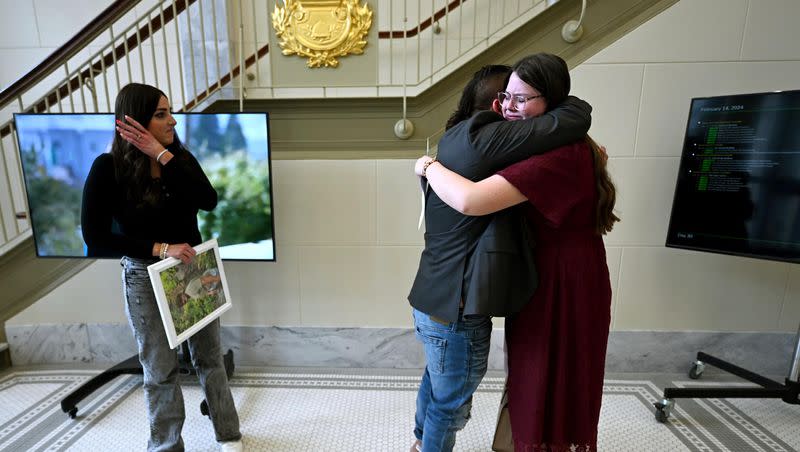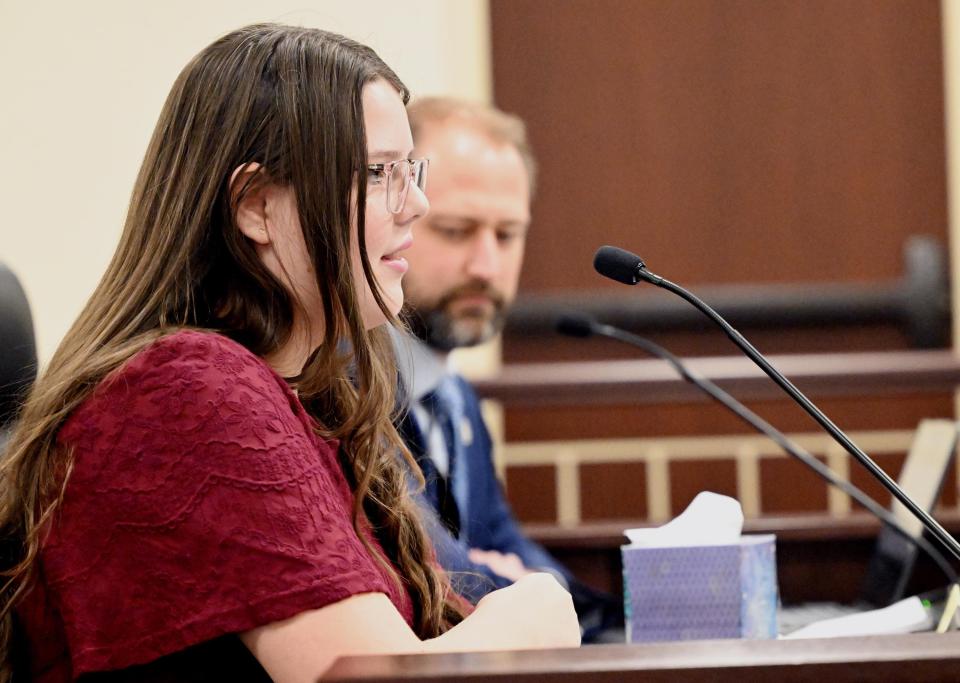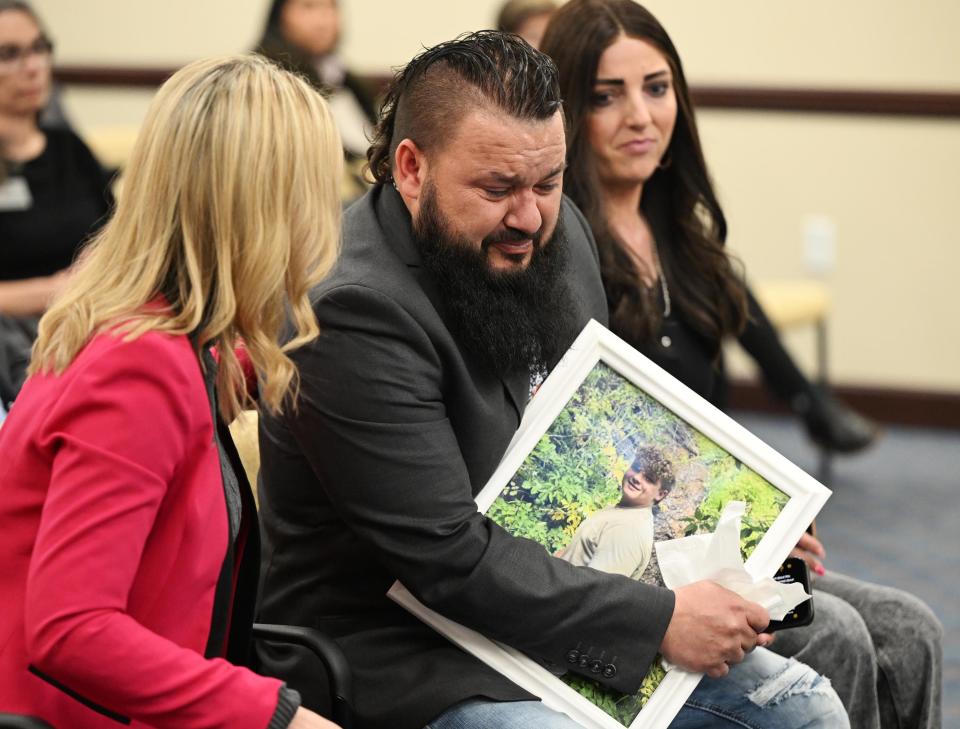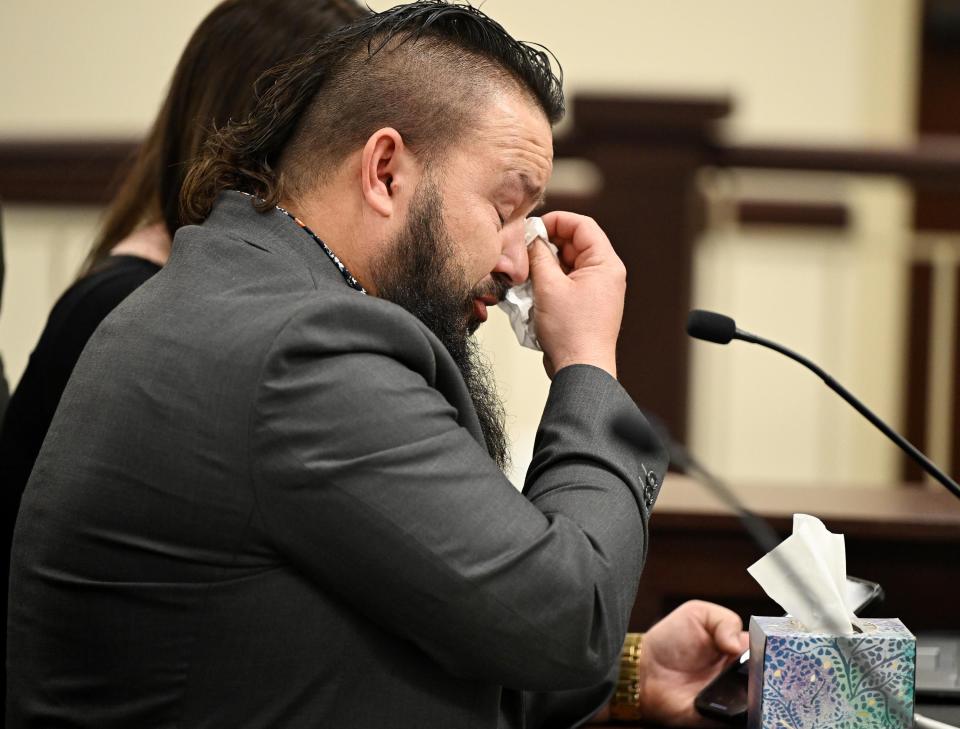‘My personality changed,’ Utah teen says about social media usage in emotional bill hearings

- Oops!Something went wrong.Please try again later.
- Oops!Something went wrong.Please try again later.
Liddy Johnson, a high school sophomore, remembers getting her first cellphone and downloading social media. Her parents took precautions like setting limited screen time, but quickly, Johnson said, she found her way around those restrictions.
Gaining a following, Johnson posted videos and she said she started to crave validation from strangers as she continued to post.
“I thought that social media would make me happy, but it didn’t,” Johnson said in front of a Utah House committee on Wednesday. “The continuation of the use of social media eventually led to anxiety, depression and suicidal thoughts. My personality changed.”
Johnson said her story had a happy ending. She went to therapy and is now thriving as she pursues her interests in art and music. “But there are many teenagers out there that are struggling just like I did and don’t have the same resources I have.”
It was the start of an emotional hearing for Rep. Jordan Teuscher’s bill HB464, the Social Media Act Amendments. Just one floor above, a Utah senate committee discussed Sen. Mike McKell’s companion bill SB194. Together these bills are the amendments to Utah’s first of its kind social media law.
Both these bills were recommended favorably from committee on Wednesday.

Since passing the initial law (scheduled to go into effect on Oct. 1), Teuscher, R-South Jordan, and McKell, R-Spanish Fork, observed how courts have responded to similar laws in other states and worked with social media companies to make amendments to the Utah Social Media Regulation Act. Both bill sponsors in their respective hearings stressed that these changes to the bill would give it a better chance at standing up in court.
Related
Primarily, HB464 allows for the pursuit of a private right of action in cases where a child is harmed by excessive social media use and also establishes a defense for social media companies.
Teuscher said social companies would be entitled to an affirmative defense against a private right of action if:
They limit a minor’s use on the social media platform for under three hours a day.
They limit a minor’s use of platform outside of 10:30 p.m. to 6:30 a.m.
They disable engagement-driven design elements.
They get affirmative consent from a parent or legal guardian of a minor on the account.
Karl and Brittney Obray came as part of Teuscher’s presentation after Johnson’s remarks. “Like Liddy said, a lot of kids don’t have a second chance or a happy ending. Our son was one of those that didn’t have a happy ending,” Brittney Obray said, holding up a picture of her son.
Dexton Obray was the kind of kid who got roses for every girl in his class for Valentine’s Day and who everyone adored. “Dexton’s giant heart led him to be the biggest teddy bear ever,” Brittney Obray said.
When Dexton Obray joined social media, Brittney Obray said the algorithm targeted him for his depression and showed him videos with self-harm content. “It consumed his life,” she said. Eventually, he came to his parents and told them he was depressed and anxious. They got him into counseling and he joined a football team.
Dexton Obray died by suicide when he was 14 years old. When his parents went onto his phone to make sense of what happened, they found “dark videos that you could just feel the darkness slowly telling him he was worthless and that he had no meaning in life.” Karl Obray said his son was fed these kinds of videos on social media based on the algorithm.
Brittney and Carl Obray as well as Johnson testified at McKell’s hearing, too.
SB194 would require social media companies to verify the ages of new account users using an approved system. On Utah children’s social media accounts, companies would be required to enable the maximum default privacy settings. These companies would also have to offer supervisory tools for Utah parents and legal guardians (enabled by the minor) to set time limits on children’s accounts and schedule mandatory breaks.

Related
Zach Rausch, associate research scientist at New York University and researcher for Jonathan Haidt, said he’s been studying the youth mental health crisis. “To put it really briefly, I am going to make the case that yes, there is a direct link between social media use and poor mental health outcomes among adolescent girls in particular.”
The Gen Z suicide rate, especially for girls, has risen. The rate for adolescent girls is “higher today than any previous generation of girls before them that we have data for in the five major Anglosphere countries — that’s the U.K., Canada, Australia, New Zealand and the United States,” Rausch said.
“Girls who spend more than five hours on social media per day have three times the rate of depression as those who spend no time at all on social media,” Rausch said. He pointed to other studies that show the rate of depression and anxiety increases with increased social media use as well.
Rausch surmises that the harm doesn’t solely come from the content, but the design features. “The design features of these platforms are meant to increase the engagement and the amount of time that is spent on these platforms without the user actually wanting to spend that time,” Rausch said. “And this is what is leading to spending eight to nine hours on screen per day.”
A litany of other presenters followed, including Jonathan Rothwell, principal economist at Gallup and non-resident senior fellow at the Brookings Institution. Rothwell said he and other researchers collected data from adolescents about social media usage and found the average teenager in America spends nearly five hours a day on social media apps.
“We also found, getting to the heart of the matter, that there’s a strong relationship between social media and youth mental health problems,” Rothwell said, noting the more time children spend on social media, the more likely they were to display negative mental health behaviors.
The bill sponsors also played a video from U.S. Surgeon General Vivek Murthy. “To my colleagues in Utah, I’m grateful you are taking up this critical issue today,” Murthy said. “And while as a surgeon general, I cannot endorse any specific legislation, I’d like to share with you some key findings from my advisory as you begin your hearings.”
Murthy said social media usage among children is near universal and there’s not sufficient evidence to safe it’s safe for kids. While Murthy noted social media offers benefits like communities of interests and ways to connect with friends, research shows harms to children like worsening anxiety and depression with social media usage.
“Until now, the entire burden of managing social media harms has fallen on the shoulders of young people and parents. That is unacceptable,” Murthy said. “It is past time that public health leaders and policymakers have their backs.”

Related
During public comment for Teuscher’s bill, Maryann Martindale, CEO of Utah County Physicians, said the association supports the bill. “There’s virtually no medical association that has not come out with an affirmative statement that we need to do something drastic about this.”
Daniel Cochrane, senior research associate with the tech policy center at the Heritage Foundation, said the amendments “would undermine that critical progress” Utah has made in leading the nation for children’s online safety.
“It guts the requirements that social media platforms provide parents with full access to their kids’ posts and messages,” Cochrane said. “And it allows platforms to defend themselves in litigation if they merely restrict continuous scroll and autoplay functions for minors accounts.” He urged legislators to build more protections for kids “rather than watering down the Social Media Regulation Act.”
Deputy director for state and federal affairs at industry group NetChoice Zach Lilly spoke in opposition to the bill. He said one of his concerns was that the private right of action allowed by the bill could extend beyond its original intent.
“The other concern is that this being a response to ongoing litigation could be seen as an attempt to financially punish companies for trying to protect themselves in court, vindicate their First Amendment rights and punish speech that the state does not like,” Lilly said, encouraging lawmakers to not support the bill.
Over at McKell’s bill hearing, Sheri Mattel, the Utah PTA Safety Commissioner, spoke in support of the bill. “Utah PTA is the largest child advocacy group in the state, and we actually only take positions on bills that we have resolutions for,” she said.
Both bills were favorably recommended from committee, which means the next significant step is for them to be voted on by the Utah House and Senate.

